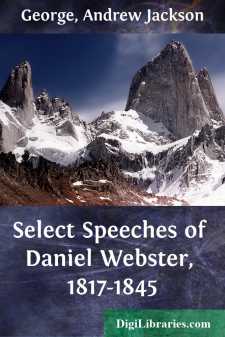Categories
- Antiques & Collectibles 13
- Architecture 36
- Art 48
- Bibles 22
- Biography & Autobiography 813
- Body, Mind & Spirit 142
- Business & Economics 28
- Children's Books 17
- Children's Fiction 14
- Computers 4
- Cooking 94
- Crafts & Hobbies 4
- Drama 346
- Education 46
- Family & Relationships 57
- Fiction 11829
- Games 19
- Gardening 17
- Health & Fitness 34
- History 1377
- House & Home 1
- Humor 147
- Juvenile Fiction 1873
- Juvenile Nonfiction 202
- Language Arts & Disciplines 88
- Law 16
- Literary Collections 686
- Literary Criticism 179
- Mathematics 13
- Medical 41
- Music 40
- Nature 179
- Non-Classifiable 1768
- Performing Arts 7
- Periodicals 1453
- Philosophy 64
- Photography 2
- Poetry 896
- Political Science 203
- Psychology 42
- Reference 154
- Religion 513
- Science 126
- Self-Help 84
- Social Science 81
- Sports & Recreation 34
- Study Aids 3
- Technology & Engineering 59
- Transportation 23
- Travel 463
- True Crime 29
Select Speeches of Daniel Webster, 1817-1845
Description:
Excerpt
Burke and Webster are models in the forensic literature of our own language as truly as are Demosthenes and Cicero in the language of the ancient classics. Each has distinct and inimitable characteristics which give force and beauty to his work. The study of each should be ordered in such a way as to put one in touch with those qualities of mind and heart, of intellectual and moral manhood, by which each became a leader in political philosophy and a model in literary style. One who studies such authors in order to formulate a historical or a personal estimate merely, or to compare each as to certain externals of rhetorical form, has lost the true perspective of literary judgment.
Reading in the school and in the home is far too often pursued with a purpose to controvert and prove rather than to weigh and consider. Reading which does not result in enlarging, stimulating, and refining one's nature is but a busy idleness. The schools must see to it that the desultory and dissipating methods of reading, so prevalent in the home, are not encouraged. Pupils must be stimulated first of all to enjoy what is beautiful in nature and in art: for here is
"A world of ready wealth,Their minds and hearts to bless--
Spontaneous wisdom breathed by health,
Truth breathed by cheerfulness."
The wisdom of the classroom is too often "art tongue-tied by authority," and hence it is not wisdom at all, but a sham and a pretence. Not until pupils rise to the spontaneity which betokens a genuine love for the work in hand do they secure the richest results.
The publication of the masterpieces of the epic, the lyric, and the drama; of the novel, the essay, and the oration, in a convenient form and at such a price as to bring them within the reach of our schools, makes it inexcusable if pupils are allowed to be ignorant of the great literary, ethical, and artistic impulses which have touched and quickened the life of the past.
Burke's American Orations present him at his best as a statesman, an orator, and a stylist. When the edition of those speeches was prepared, a selection from Webster's great speeches was contemplated as a companion volume. The present edition represents Webster in the various and distinct fields in which his genius manifested itself so powerfully and so nobly. He is here seen before a jury, before the Supreme Court of the United States, on a great historical occasion, in the Senate of the United States, in a great national canvass, and as a eulogist.
Had it not been for making the volume too large for school use I should have included the famous speech delivered in the Senate on the 7th of March, 1850. This speech has been considered by many as the vulnus immedicabile of Mr. Webster's political life; it is certain that for it he was most rankly abused. "Massachusetts," as Hon. John D. Long has said, "smote and broke the heart of Webster, her idol, and then broke her own above his grave, and to-day writes his name highest upon her roll of statesmen."
I find in this speech nothing but what is consistent with Mr. Webster's noble adherence to the Constitution and the Union; nothing but what is consistent with the solemn duty of a great man in a great national crisis.
In his address at Buffalo on the 22d of May, 1851, he expressed himself very freely in regard to this speech, saying: "I felt that I had a duty to perform to my country, to my own reputation; for I flattered myself that a service of forty years had given me some character, on which I had a right to repose for my justification in the performance of a duty attended with some degree of local unpopularity. I thought it was my duty to pursue this course, and I did not care what was to be the consequence....


